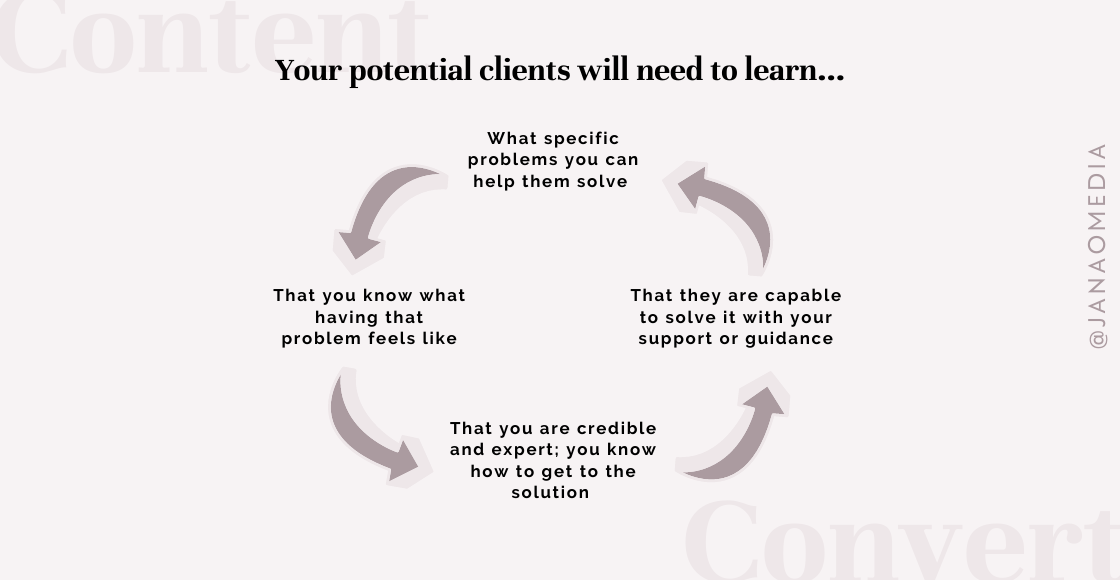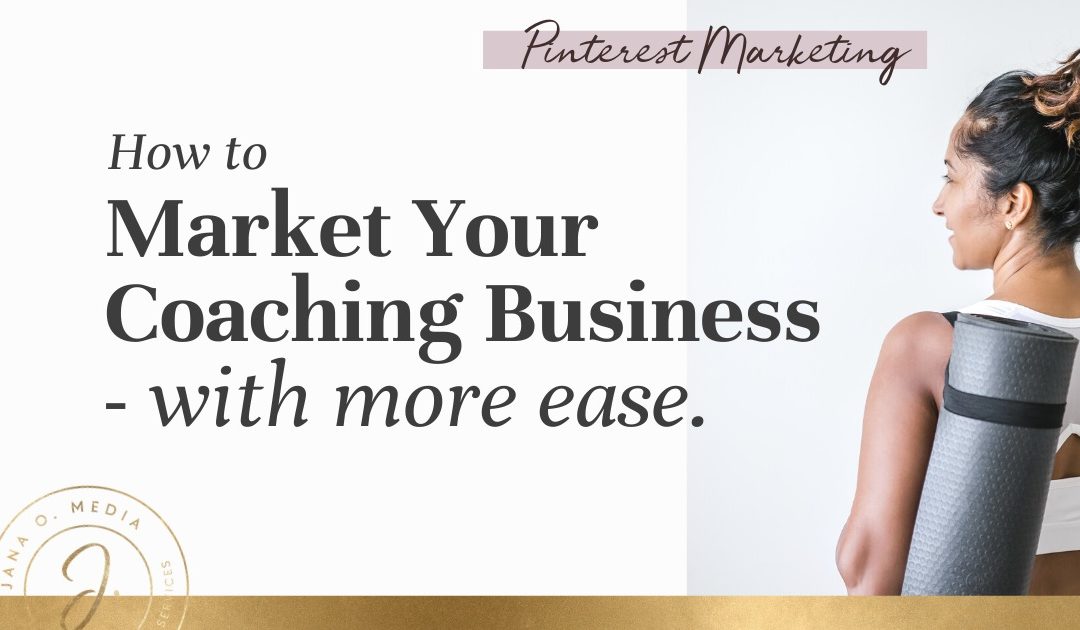When you ask, “How do I market my coaching business?” there are, like, at least 1,367 answers. 😫 Indeed, there are dozens of things that conventional wisdom tells us we “have” to do.
The hustle is real, right?
Share your life on IG stories every day. DM 20+ people. Dance for reels or TikToks. Post in Facebook groups. Engage with potential clients… everywhere… Oh, and are you starting rooms on Clubhouse? The list goes on.
Every single day you’re checking off all of the tasks…
But what if you take a few days off? What if you go on vacation? What if one day you just forget – or you just don’t want to? What happens then?
Will you lose out on that dream client? Will you return to ZERO discovery calls on your iCal? Will you miss those monthly income goals?
Will everyone forget you exist? Will your entire business come crashing down? (Okay, that’s a little dramatic. 😉)
But seriously… the truth is that a lot of marketing tactics for coaching businesses rely on you showing personally and daily – for every lead and every sale.
So, yeah. The hustle CAN BE real. But, that is definitely not what we’re about here. In fact, I’m about to offer you some life-altering strategy shifts that can seriously calm that hustle…
In this post, you’ll learn…
- Why it’s a really good idea to tune into less hustle-based ways to market your coaching business
- How to market your coaching business by building your “body of work”
- The most effective way I know to automatically nurture prospects who find you
- What platforms are best for marketing your coaching business on autopilot
Ready? Let’s get into it, starting with…
Why market your coaching business using strategies that are less “hustle-based?”
So we already know that hustle-based marketing strategies (ones that require you to show up personally and post every day) can lead to burnout – and just aren’t always sustainable. But are there even other options? And why would you use those options when social media marketing has worked so well for you so far?
Let’s look at a personal example:
I’ve been on Clubhouse a lot since it first started blowing up and I love it. BUT, I’m not putting all of my eggs in that basket – nor am I putting all of my eggs in any basket for marketing my business.
Because I know that, as fun and effective Clubhouse is for me right now, it’s a place where I have to show up personally at a certain time.
I know that when it’s time for me to take a vacation and travel more with my husband (We’ve got Montreal, Madrid, Venice, and the Greek Islands on our bucket list right now! ✈️)…
… I’m not going to be able to show up on Clubhouse daily. So I want to make sure that I have something that is working for me in the background. Something that is more easeful and makes me less reliant on the hustle-based strategy that I use for marketing my business on Clubhouse.
I’m pretty willing to bet that you feel the same way, right?
Sure, social media can be fun and can lead to great, fast results for your coaching business. But they also require you to show up – over and over and over again. And when it comes time for you to take a break, the lead pipeline you’re priming there usually dries up pretty quickly.
You want to ALSO** have marketing strategies for your coaching business that works for you in the background. Ones that are easy and sustainable.
So in the rest of this post, I’m highlighting three strategies – systems, really – that work for marketing your coaching business – even when you’re not working.
**Note: It’s a rare situation that I ever recommend that you completely abandon social media in favor of these more sustainable strategies. However, I think it’s important to also spend time and effort on putting these less time and energy-draining strategies into place – because they can have a huge benefit on your business…(and your wellbeing!)
Alright, now onto the strategies!
1. Market your coaching business by creating and growing your ‘body of work.’
The first strategy that I recommend for marketing your coaching business in a way that is less hustle-based is by growing your “body of work.” This could be…
- Your blog
- Your podcast
- Your YouTube videos
- any other kind of long-form, helpful content
Doing this can be beneficial because when people find you, they often need to learn more before they buy. They need to be able to understand:
- Exactly what specific problems you can help them solve
- That you know what having that problem feels like for them
- What solving that problem is / will feel like
- That you are credible and expert – basically that you know how to help them solve this burning problem
- That they are capable to solve it – with your support and/or guidance.
Your body of work (blog, vlog, or podcast with show notes) is there to show them all of this.

When you create and build a body of work that answers those questions and speaks to those concerns, people can find you at all hours of the day and binge on your content. It’s like having a 24/7 sales person for your business – without you having to actually perform work or communicate 1 to 1 with them – each time someone lands on your website.
When you plan content (for whatever platform it is that you choose) and create it, you should always be asking what the purpose of this piece of content is. Which of the above things that your potential client needs to understand is that piece of content there to show them?
This is the key to content that converts.
And once you’ve answered their questions and given them the value, be sure to always include a CTA (call-to-action) to help them continue on the customer journey path that you’ve set out for them. Your CTAs could include, for example, calls to…
- Sign up for a discovery call
- Grab a free lead magnet and join your email list – where you can continue the conversation
- Read another blog post that will further deepen your relationship
- Follow you on social platforms
- Comment or send you questions
- Etc.
(There are really endless ways to bring them along on the customer journey – developing more and more like, know trust… and edging them closer to becoming a client or buyer.)
Let’s look at an example.
Say that you’re a health coach who specializes in helping women break sugar addictions. One way to market your coaching business is on social media — writing Instagram posts, creating reels, posting on stories, and engaging in Facebook groups… You know. Doing the hustle-based work to get clients.
At the same time, however, you could be writing blog posts that answer some of your most frequently asked questions. (Alternatively, video posts and podcast episodes work, too.) Through them, you can help women understand why they might want to get off of sugar.
One blog post that you might write could be “5 Ways Quitting Sugar Will Transform Your Health & Your Life.” You’ll cover some of the biggest problems that too much sugar can cause – and how getting off sugar can solve those problems. (And you’ll describe those problems vividly. You’ll communicate your own expertise on this subject…)
With your reader fully convinced it’s time to get off sugar, this is the perfect spot to offer her an irresistible free resource (i.e. lead magnet like a downloadable)… all about how to get off of sugar (and get her on your email list; where you can continue to nurture her as a prospect). Note, this is also an effective strategy for giving her a quick win. By doing so you prove your own expertise, and her capability to move toward a solution. 😉
(Another possible CTA could be to book a free call to talk about how you can help her break the sugar addiction. Or maybe your CTA is to purchase a mini-course or reserve a seat for your next webinar… You get the idea!)
The main thing to understand though is this:
This blog post is then out there for anyone to find at any time. This piece of content you created once is now able to continuously bring people into your world – each and every time that someone finds it.
And the more blog posts you write that give your people the impactful and useful information they need (the problems you can solve, how you can solve them, that you’re an expert, etc.), the more people will end up becoming leads and clients. How cool is that?
And if you think that’s cool, keep reading for another fantastic way that you can start to *nurture* those leads on autopilot, too…
(Pssssst…. You can 📌 pin this article for reference to your “Pinterest marketing” or “Coaching Business Marketing” board:)

2. Market your coaching business by automatically nurturing new email list subscribers.
When you build your body of work (whether it’s blog posts, podcasts, YouTube videos, or something else that’s discoverable 24/7), the natural progression is that you’ll want to start building your email list.
You can do this by offering freebies (also called lead magnets or content upgrades) in exchange for an email address – as described above! In this way, you are growing a list of people who have self-selected. They’ve raised their hands and said, “Yes! I’m interested in this thing you help people with!”
But what happens once they get on your email list?
Well, Lovely, this is the exciting part…
Any good email service provider will allow you to create automatic sequences that send out when a person opts in for your freebie. This means that you’ll not only be able to capture those leads – but you’ll be able to nurture them automatically using a welcome sequence.
A welcome sequence is essentially just a series of emails that go out automatically over the first few days that someone is subscribed to your email list, telling them more about who you are and what you offer. Again, it’s about deepening the relationship, helping them understand more about what you do – and why it matters to them.
And the beauty of an email nurture sequence is that you don’t have to send this information out manually to every person who self-identifies. Your email software will do it for you – automatically, on a pre-set schedule. Your leads don’t have to wait for you to be personally available to send it – and they can consume it on their own schedule.
You can configure a nurture sequence in many ways, but here’s a simple outline that I sometimes provide to my Pinterest marketing clients who are in need of getting one set up:
- Day 1 (immediately after sign-up): Short introduction and lead magnet delivery
- Day 2: Did you have a chance to download / watch the free thing? Here’s the link again.
- Day 3: Describe more about who you are, your business, your why (and why it might matter to them! 😉
- Day 4: Share your top three pieces of free value content (e.g. blog posts, podcast episodes, etc.)
- Day 5: Offer a soft sell to a product or service (optional in a welcome sequence)
- Day 6: Describe “future pacing”… What’s next, how often they will hear from you and with what… and possibly include a feedback request (for example, ask them to reply to the email to answer an easy, defined question.)
As you can see, your nurture sequence tells people who you are and what you’re all about, and positions that in the context of what you can do for them. It also provides your lead with even more free value, AND can give her the opportunity to continue her relationship with you by buying a product or service.
And the best part is that this is all happening automatically — even while you’re out getting your nails done, having lunch with your mom, or at your kid’s baseball game. 😉
3. Market your coaching business on at least one search engine platform.
Okay, so we’ve established preeeeettttty clearly 😉 in this blog post that being everywhere all the time can be exhausting. (And honestly impossible if you don’t have a huge team of people supporting you!)
BUT when you’re considering which platforms you DO want to go all in on (and to be consistent on) for marketing your coaching business, I highly suggest considering making one of them a platform that is a search engine.
The main search engine marketing platforms include…
- YouTube
Strategically leveraging at least one of these platforms is super helpful – as an addition to your social media marketing strategy – because…
- People are able to find your content for months and years after it’s first published in the search results (vs. social media, where your posts are often lost in a fast-moving newsfeed).
- The people who find that content are specifically looking for the content that you create – and for info / solutions around what you help with (vs. on social media, where people are largely just looking for entertainment – or a distraction).
- You don’t have to do anything to get them there; the search engines do it for you.
- These platforms make it a LOT easier to get people on your website and keep them there, where you’re able to guide them through your intentionally-designed customer journey path.
All of this means that you’ll be less dependent on those hustle-based strategies that social media sometimes requires. Because the search engines do a LOT of the work for you – if you invest time in leveraging them to market your coaching business.
There. Doesn’t that make answering the “How do I market my coaching business?” question feel a lot less overwhelming? <3 (Hope so! That’s my goal here!)
Now let’s talk about my personal favorite of the search engine marketing platforms…
Perhaps Pinterest marketing is right for your coaching business!
So, using a search engine as a part of your easeful marketing strategy is key to getting the right people to see your content when they want it – and Pinterest is one of my favorite search engines for marketing your coaching business.
Believe it or not, Pinterest is, in fact, a search engine. It’s not social media, as many coaches initially think. 😯
Here are a few reasons why I love it for marketing coaching businesses:
- When people come to Pinterest they are looking for ideas, inspiration, and often for help for specific problems. They are looking for ways to make their lives and businesses better. Your post can show up for them at the exact right time – when they are open to what you offer.
- Pinterest is NOT just about recipes, weddings, and home decor anymore. In fact, the variety of things people are searching has expanded enormously – and health, wellness, relationships – and all things self development are now HOT HOT HOT on the platform!
- Pinterest users are action-takers and purchasers (89% are on Pinterest for purchase inspiration!) They’re open-minded and interested in improving themselves. In other words, they often make for ideal coaching clients!
- Pinterest drives way more traffic to your website than any social media platform – so if you’ve invested time, energy, money, into a conversion-friendly website… then Pinterest is honestly sort of a “no-brainer.” 🙂
- It’s low-maintenance once you set things up strategically. Time-consuming engagement really isn’t necessary for Pinterest marketing success – unlike on social. You can set up systems that allow you to do your Pinterest marketing tasks for the entire month – in a batching session – in just a few hours. (How’s that for easeful? 😍)
If you’re seeing the value of setting things up to be more sustainable… of having marketing strategies in place that work hard for you – even when you’re not actually working… then keep reading. Next up, I’ll touch on how to start using Pinterest to market your coaching business.
Ready to use Pinterest to get clients for your business?
Are you an online coach or service provider? And you want to learn how to set up a Pinterest account that will grow your audience and attract clients — on autopilot?
If so, then my course Pinterest with a Purpose was created for you!
It’s a self-study e-course that walks you through *every step* of setting up your strategy and your account. It reveals the methods I perfected over YEARS doing strategic Pinterest set-ups for clients!



